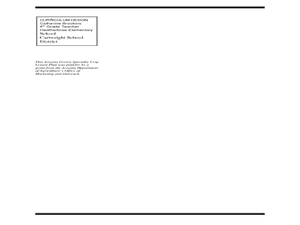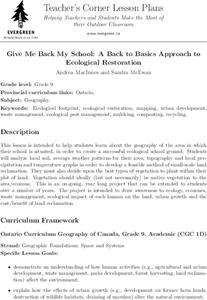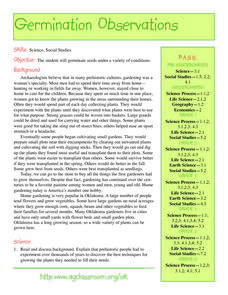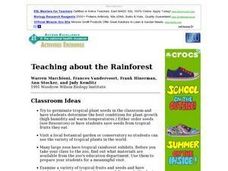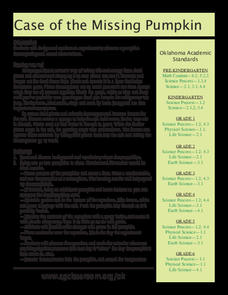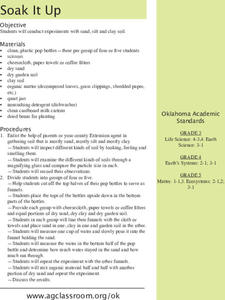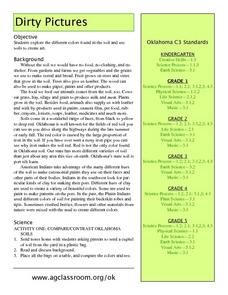Outside Education
Handmade Fettuccine
Young chefs engage in an interdisciplinary cooking lesson converting measurements within a recipe, crafting noodles, gathering herbs from the school garden, and making fettuccine for a class luncheon.
Outside Education
Plant a Plant in Anything!
Primary graders repurpose items brought from home to create containers for plants. After poking holes in their containers, kids add soil and plant seeds or transplant an item, and then observe and draw conclusions about which items...
Curated OER
Let's Make Stew!
Young scholars investigate how to create a vegetable garden and complete related activities. In this vegetable garden lesson, students receive agriculture notebooks to complete vocabulary for the gardening lesson. Young scholars read...
Curated OER
Give Me Back My School: A Back to Basics Approach to Ecological Restoration
Ninth graders research local geography to create successful, ecological school landscaping. They determine soil type, average weather patterns and temperature graphs and use the information to select ideal plants and plant maintenance...
Curated OER
Germination Observations
Students germinate seeds under a variety of conditions. First, students read and discuss the background of gardening. After reviewing germination and the steps to the scientific method, groups of students complete experiments.
Curated OER
Working Worms
Fourth graders examine earthworms. In this earthworm lesson, 4th graders investigate how earthworms help prepare soil for planting. Students examine other living and nonliving elements in a garden habitat.
Curated OER
Importance of Fresh Vegetables and Fruits in Our Diets
Students explore the importance of fruits and vegetables in our diets. In this science lesson, students discuss various types of fruits and vegetables. Students play the good health=good diet game. Students discuss types of fruits and...
Curated OER
Growing Our Own Food: Sustainable Agriculture
Students identify the common food items in their community, plant a small garden and discuss how agriculture has helped growing nations.
Curated OER
Know your roots!
Looking at an image of plant systems with their roots in the ground, learners determine which would be the most or least difficult to pull. They write short sentences describing which plant they chose and why. Intended for 3rd or 4th...
Curated OER
Soil Erosion Demonstrations
Learners conduct experiments demonstrating soil erosion and the benefits of conservation practices. Working in groups, they use topsoil and sand in shallow boxes as models to examine the effects of water on soil and sand with and without...
Curated OER
"Greenhouse" Sprouts Garden
Students grow sprouts in soil inside clear plastic bags. They record and monitor the growth for five days, and present their findings to the class.
Curated OER
Eggshell Garden
Students fill empty eggshells with potting soil and place the eggshells in an egg carton. In this science lesson, students plant seeds in each shell and using popsicle sticks mark what is planted.
Curated OER
Guardians of Eden
Students understand the definition of a guardian and the role of the guardian in caring for something. In this Garden of Eden lesson, students examine how a guardian takes care of a garden. Students complete worksheets on being a...
Curated OER
Teaching about the Rainforest - Classroom Ideas
Students are introduced to the tropical rainforest through different ways that catch their attention such as: Visit a local botanical garden or conservatory so that students can see the variety of tropical plants in the world. They...
Curated OER
How Does Your Garden Grow?
Students explore how to use natural fertilizers and pesticides by growing an organic vegetable garden by growing plants and using a variety of soil amendments.
Curated OER
Little Bloomers: Gardening With Trees
Students identify the parts of tree flowers. They examine the role they have in pollination. They discuss trees that do not flower as well.
Curated OER
Case of the Missing Pumpkin
Scientists define and discuss decomposition, and watch pumpkins decompose and return to soil in classroom experiment. They record the date the experiment began, chart changes in pumpkins on a calendar, count how many days it takes...
Rivanna Regional Stormwater Education Partnership
Does It Soak Right In?
Which materials are best for groundwater runoff, and which are best for percolation? Discuss the water table with several experiments about different types of soil, pollution, precipitation, and filtration. The experiments assign...
Curated OER
The Three Sisters
Students read about the Three Sisters of the crops that helped the Native Americans and plant a garden based on companion planting. In this crops lesson plan, students complete garden designs and then create their garden.
Curated OER
Producers and Consumers
Students make lists of producers and consumers and act as consumers that eat producers in a garden. For this producers and consumers lesson plan, students demonstrate a food chain by using a piece of yarn to connect all of them together.
Curated OER
How do rice farmers make good use of the land they use for planting rice?
Second graders discuss how farmers grow rice. In this rice growing lesson, 2nd graders see the optimal condition for land in order to grow rice. They experiment with clay and garden soil to see which holds water better.
Curated OER
Soak It Up
Students examine the various materials that make up their local soils. In groups, they record how each material is different and use cheesecloth to filter them into a bottle based on particle size. They use the soils to determine if...
Curated OER
Dirty Pictures
Students investigate how food, clothing and shelter come from soil after they examine soil from their own backyards. They map soils on the color wheel before making glue and soil pictures and tie-dying T-shirts in red soil.
Curated OER
Look Out, Below!
Students study the four layers of soil while identifying the substances that each level is composed up. They investigate the properties of soil such as color, texture, water retention and the ability to maintain life by growing a plant.




